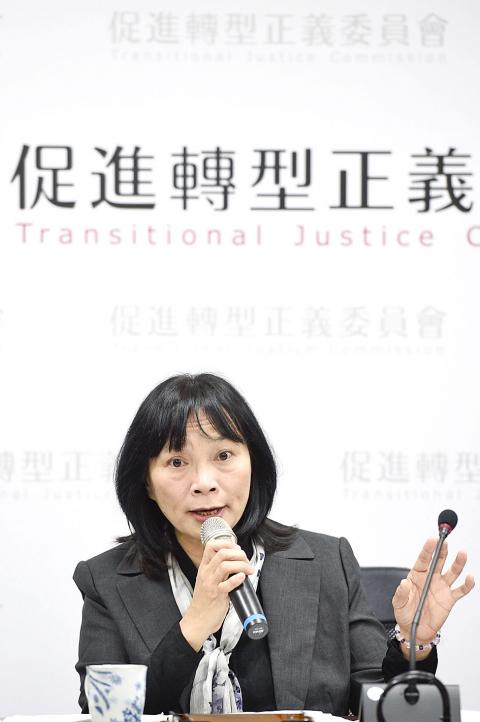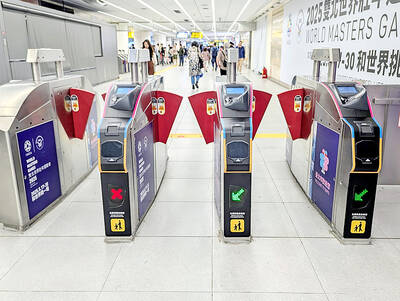Transitional Justice Commission Acting Chairwoman Yang Tsui (楊翠) yesterday said that the commission is shifting its attention to declassifying documents and dealing with authoritarian symbols.
Yang made the remarks during a radio interview, when the host asked her to comment on the commission’s next order of business following the one-year anniversary of its founding on May 31 last year.
The commission is to step up its efforts to collect records and documents from archives and depositories over the next year, with an eye toward increasing the volume of documents available, while it plans to start dealing with authoritarian symbols this month, she said.

Photo: George Tsorng, Taipei Times
When asked to identify the commission’s main challenges, Yang said that the bureaucratic instinct toward secrecy remains a difficulty during historical reconstruction and declassification efforts.
To exonerate victims of political persecution, the commission must first investigate the historical facts surrounding their cases, but the materials it has obtained from government agencies have often been redacted to the point of illegibility, she said.
The commission frequently has to negotiate with governmental agencies for access to documents in a less-censored form, she said.
An important contributing factor to these difficulties is the belatedness of the nation’s transitional justice program, she said, adding that resistance to transparency in many cases is rooted in institutional habit, not ill-intent.
“I believe transitional justice is a work of advocacy of which communication is a part,” she said, adding that the commission is overseeing its sixth large-scale transfer of documents of about 130,000 items.
Asked to name an event of personal emotional resonance she experienced as a member of the commission over its first year, Yang said that she was moved when former Japanese Imperial Navy veteran Huang Chin-tao (黃金島) showed up in a wheelchair at the commission’s first-ever ceremony on Oct. 5 last year, held to exonerate victims of political persecution, despite him suffering an illness.
“I was very much moved when I saw the corner of Huang’s eye glisten and he shook with emotion as he went through the documents of exoneration during the ceremony,” she said.
As she is a descendent of novelist Yang Kui (楊逵), who was jailed for 12 years for political crimes, it was deeply gratifying to see Huang at the ceremony, Yang said.
Born in Taichung during the Japanese colonial era, Huang served as a volunteer soldier in the Imperial Japanese Navy.
After Japan’s defeat in World War II in 1945, he was detained in China’s Hainan Province before escaping and returning to Taiwan.
He headed an armed uprising against Chinese Nationalist Party (KMT) troops following the 228 Incident in 1947, an act for which he received a death sentence that was later commuted to life in prison.
He was released in 1975 after serving 24 years in prison.
Huang died in January aged 93.

A magnitude 6.4 earthquake struck off the coast of Hualien County in eastern Taiwan at 7pm yesterday, the Central Weather Administration (CWA) said. The epicenter of the temblor was at sea, about 69.9km south of Hualien County Hall, at a depth of 30.9km, it said. There were no immediate reports of damage resulting from the quake. The earthquake’s intensity, which gauges the actual effect of a temblor, was highest in Taitung County’s Changbin Township (長濱), where it measured 5 on Taiwan’s seven-tier intensity scale. The quake also measured an intensity of 4 in Hualien, Nantou, Chiayi, Yunlin, Changhua and Miaoli counties, as well as

Credit departments of farmers’ and fishers’ associations blocked a total of more than NT$180 million (US$6.01 million) from being lost to scams last year, National Police Agency (NPA) data showed. The Agricultural Finance Agency (AFA) said last week that staff of farmers’ and fishers’ associations’ credit departments are required to implement fraud prevention measures when they serve clients at the counter. They would ask clients about personal financial management activities whenever they suspect there might be a fraud situation, and would immediately report the incident to local authorities, which would send police officers to the site to help, it said. NPA data showed

ENERGY RESILIENCE: Although Alaska is open for investments, Taiwan is sourcing its gas from the Middle East, and the sea routes carry risks, Ho Cheng-hui said US government officials’ high-profile reception of a Taiwanese representative at the Alaska Sustainable Energy Conference indicated the emergence of an Indo-Pacific energy resilience alliance, an academic said. Presidential Office Secretary-General Pan Men-an (潘孟安) attended the conference in Alaska on Thursday last week at the invitation of the US government. Pan visited oil and gas facilities with senior US officials, including US Secretary of the Interior Doug Burgum, US Secretary of Energy Chris Wright, Alaska Governor Mike Dunleavy and US Senator Daniel Sullivan. Pan attending the conference on behalf of President William Lai (賴清德) shows a significant elevation in diplomatic representation,

The Taipei MRT is to begin accepting mobile payment services in the fall, Taipei Rapid Transit Corp said on Saturday. When the company finishes the installation of new payment units at ticketing gates in October, MRT passengers can use credit cards, Apple Pay, Google Pay and Samsung Pay, the operator said. In addition, the MRT would also provide QR payment codes — which would be compatible with Line Pay, Jkopay, iPass Money, PXPay Plus, EasyWallet, iCash Pay, Taiwan Pay and Taishin Pay — to access the railway system. Currently, passengers can access the Taipei MRT by buying a single-journey token or using EasyCard,